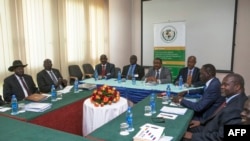The first phase of South Sudan’s peace agreement signed between the government and the rebels to end the 20-month conflict goes into effect Saturday.
Ateny Wek Ateny, spokesman for President Salva Kiir, says the administration in Juba is committed to the full implementation of the accord despite reservations about the agreement. He says Mr. Kiir’s reservations were about some stipulations in the agreement that violate the country’s sovereignty.
Ateny says the president’s order to the national army soldiers not to go on the offensive against the rebels is a strong indication of his commitment to ensure a successful implementation of the accord to restore peace and stability in the world’s newest nation.
Former vice president and rebel leader Riek Machar has also instructed his rebels to stop fighting as part of the process to fully implement the peace agreement.
“The government soldiers are actually ordered not to go on any offensives except when they are attacked, then they can defend themselves. So, this is the start of the implementation of the peace agreement,” said Ateny.
“President Salva Kiir and the government are willing to implement the peace agreement with the exceptions of those reservations because those reservations are a matter of sovereignty. And by telling the president to implement them fully, you are suggesting that South Sudan shouldn’t be a sovereign country, it should be a country under the mandate of the United Nations,” said Ateny.
He also says Kiir’s reservations about the agreement are crucial to the implementation of the accord.
But, the U.N. Security Council warns it is ready to impose sanctions on South Sudan's warring factions if they fail to fully implement the new peace agreement.
The world body also called on the two warring factions to immediately cease fire.
Ateny says it would be catastrophic for the U.N. to impose sanctions on South Sudan. He contends that the country is currently too fragile for such pressure from the international community.
“The threat of sanctions does not solve the problem. It would only aggravate the situation,” said Ateny. “South Sudan is so delicate to the extent that if it is sanctioned, the whole country can collapse and if it collapses there would be anarchy and the international community would not be able to control [it].”
Meanwhile, the second phase of the peace accord, which includes the formation of a unity government, will commence in 90 days after the cease-fire is successful.





